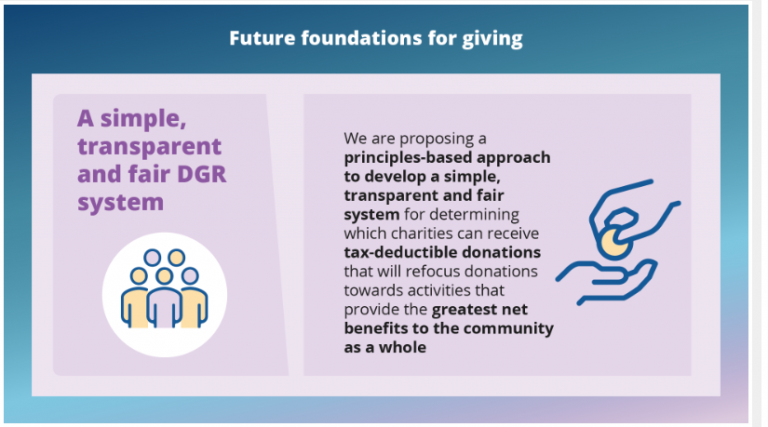The Treasurer delivered the 2024–25 Budget on Tuesday 14 May 2024, with a focus on cost of living,...

Productivity Commission Releases Draft Philanthropic Report

The Government has asked the Productivity Commission to investigate motivations for philanthropic giving in Australia and identify opportunities to grow it further.
The review comes at a time when the charity sector is under pressure. Over recent decades, Australians have become less likely to join community groups, less likely to volunteer, less likely to play organised sports, less likely to attend religious services, and less likely to know their neighbours. Declining social capital has broad implications for wellbeing, health and social connectedness. Philanthropic giving underpins the crucial efforts of charities, not-for-profit organisations and community groups to support vulnerable Australians and build social capital and connectedness in Australian communities.

Credit: Future Foundations For Giving Productivity Commission draft report
Draft Report Key Points
- The Commission’s proposed reforms aim to make the deductible gift recipient (DGR) system simpler, fairer and more consistent. All Australian taxpayers co-invest in charities through the DGR system, but the arrangements that determine which entities can access DGR status are not fit for purpose – they are poorly designed, overly complex and have no coherent policy rationale. Reform is needed to simplify the DGR system and direct support to where there is likely to be the greatest net benefits to the community. If adopted, the Commission’s draft recommendations would mean that more charities overall would be able to access tax-deductible donations.
- Increasing the transparency of corporate giving. Corporate giving in Australia is significant. An Australian study estimated that corporate giving – in the form of donations, noncommercial sponsorships and partnerships – was $17.5 billion dollars in 2015-16, with donations alone worth $6.2 billion. However, the precise value and make up of corporate giving is highly uncertain because many businesses report giving as an expense and do not separately report it to the ATO, and there is scope to increase the transparency of – and improve accountability for – corporate giving.
- Regulation to strengthen donor protection through online giving platforms. Online giving platforms have changed how people donate and can create new risks and challenges for donors and charities. The Commission is seeking further information and evidence on the costs, benefits and need for changes to regulation of online giving platforms.
- The Australian Government should create more value for the public from the data collected about charities by improving the ACNC charity register, and collecting and publishing additional data on ancillary funds, corporate giving, volunteering and charitable bequests.
- The Australian Charities and Not-for-profits Commission (ACNC) and the Australian Taxation Office (ATO) should work together to enhance the utility of Australian Government sources of information on charities and giving for donors and the public.
- Proposed minimising unnecessary regulatory barriers to volunteering.
- Structured giving vehicles could be enhanced, and the benefits of ancillary funds to the community could be bolstered.
- The Australian Government should establish a National Charity Regulators Forum with state and territory regulators to create a more formalised regulatory architecture.
- A public information campaigns for giving, supported by government, could help broaden participation in giving, but it was reported that there is insufficient evidence to conclude that it would be effective or that it would produce net benefits for the Australian community in the context of support that is already provided.
- The Australian Government should support the establishment of an independent philanthropic foundation controlled by – and for the benefit of – Aboriginal and Torres Strait Islander communities to enhance the arrangements linking philanthropic and volunteer networks and funding to Aboriginal and Torres Strait Islander organisations.
- Commission reported that administrative expenses are not an accurate reflection of the performance of a charity.
- The report also presented findings on of how and why Australia’s currently give.
Workplace Giving Australia is pleased to review the Commission’s report, and it is positive to see the focus on ensuring trust in the sector is bolstered, protected and elevated. DGR reform is also overdue, and it’s productive to see this moving in the right direction. Corporate reporting will provide confidence to both donors and organisations to move forward in the giving space. Furthermore, there are some encouraging elements to see that donations may flow through to charities without delay, with a focus on enhanced disclosure and reporting of organisational giving.
We must be conscious that ‘corporate giving’ alone doesn’t build community. A combination of individuals, the workplace and employers supporting employees creates the real power of giving. When corporates include the whole workforce, declining community connectedness and staff engagement can be improved.




